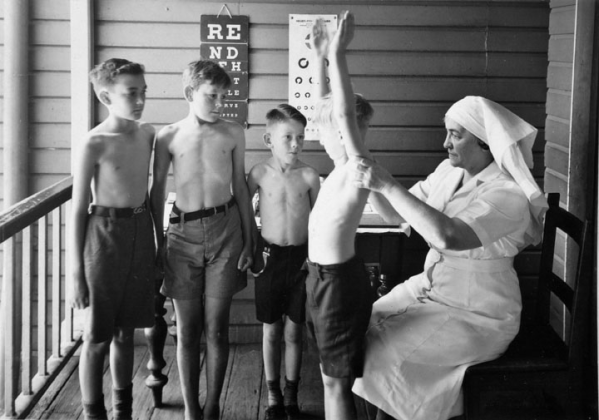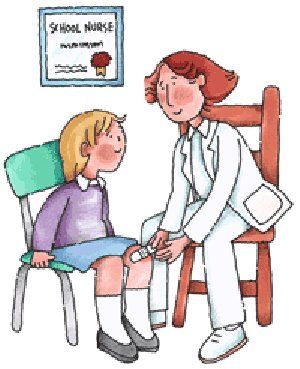
We’ve all seen the infamous Dr. Pepper advert – The one where the young boy goes to see the school nurse, his drink spills over the intercom system, and the entire school listens to part of their conversation. As the young boy walks out of the nurse’s office, the entire school is stood outside mocking him, and the slogan “Dr. Pepper, what’s the worst that could happen?” is displayed across the screen.
In this scenario, the worst that could happen was that the young boy’s classmates ridiculed him for overhearing part of a conversation which hinted that he was suffering with an embarrassing male problem ─ but in reality, having no nurse at all could have fared far worse.
Joking aside, it seems clear that school nurses, and healthcare within the school environment, is very much taken for granted.
The school nurse plays a crucial role in the seamless provision of health services to pupils. Increasing numbers of pupils enter school with various health conditions that require management during the school day.
After the child’s home, school represents the second most influential environment in their life. As more pupils enter school with health or mental health problems, school nurses face the challenge of managing their care throughout the school day.
It’s clear the role of the school nurse is integral to the running of schools, so why is the government failing to tackle the decline in the profession in recent years?
The Royal College of Nursing (RCN), has said that failure to reverse the decline of school nurses will have damaging consequences for delivering essential sex and relationships education, and safeguarding children against sexual exploitation and abuse.[1]
It was revealed at the RCN conference last week “that the number of school nursing posts has fallen by 13 percent since 2010 to just 2,606 in the NHS”.[2] This equates to a ratio of just one nurse to every 3,333 pupils.
What is even more shocking, is that last year, a BBC report based on freedom of information requests revealed that there were 5,500 sexual offences recorded in UK schools between 2011 and 2014, including one rape nearly every school day. (Paul Gallagher, para. 5)
Without school nurses to offer impartial and consistent sexual education to pupils, how can we ensure young adults are being educated, and, ultimately protected, in this field?
The RCN position statement claims they believe that school nurses with appropriate training and experience are able to assess the need for hormonal emergency contraception, and to supply this contraception. Alongside, this, the RCN believes that school nurses should be appropriately skilled and competent to offer sexual health advice.[3]

It is clear that school nurses have the potential to not only educate pupils in sexual health and relationships, but to also offer practical advice and care if a situation were to arise.
Alongside sexual health issues, mental health plays a major role in the current educational climate. A recent review, held by Children’s Commissioner Anne Longfield, found that more than a quarter of children referred to mental health services in England last year received no help. Perhaps more shocking, is that some of the children included in this group had attempted suicide or lived with life-threatening conditions such as anorexia nervosa or psychosis.[4]
Data from the charity Young Minds shows that 1 in 10 children and young people aged five to 16 suffer from a mental health disorder – that is around three children in every class.[5]
Of the 277 nurses surveyed by the RCN, 68 percent believed there were insufficient school nursing services in their area to provide the care and support children and young people need, and 70 percent of them said their current workload was too heavy.[6]
So just to recap, school nurses directly assist pupils with mental health issues, which we know is on the rise, alongside sexual health issues, which again, we know is on the rise; however, the list doesn’t end there.
Earlier this month, the Department of Health published ‘Childhood obesity: a plan for action’ ─ a governmental attempt to tackle the growing obesity epidemic in the UK.
The plan states that primary schools will now be expected to offer at least 30 minutes of “moderate to vigorous” physical activity every day, through break times, extra-curricular PE clubs and active lessons.[7]
The government’s strategy has been widely criticised for shifting the main responsibilities for tackling childhood obesity onto schools. But with school nurses on the decline, will schools be able to fulfil their duty?
Fiona Smith, RCN Professional Lead for Children and Young People’s Nursing, said: “School nurses are there for all children and young people, providing support, encouraging healthy lifestyles and protecting those who are most vulnerable. They have the training and expertise to really drive forward effective sex and relationships education in schools; however, with numbers dropping all the time, school nurses simply don’t have the capacity to follow this through.” (Nursing in practice, para. 11).
Perhaps, a solid investment in the future of school nurses could be a step towards helping tackle these increasing issues, which are unfortunately, becoming more and more apparent in everyday school life.

[1] Paul Gallagher (2016) ‘Lack of school nurses ‘putting vulnerable children at risk’’, <https://inews.co.uk/essentials/news/health/school-nurses-decline-children-serious-risk/> [Accessed: 30 August 2016]
[2] Nursing in practice (2016) ‘Drop in school nurses puts children at risk of sexual abuse says RCN’, <http://www.nursinginpractice.com/article/drop-school-nurses-puts-children-risk-sexual-abuse-says-rcn> [Accessed: 30 August 2016]
[3] RCN (2012) ‘RCN position statement: The role of school nurses in providing emergency contraception services in education settings’, <https://www2.rcn.org.uk/__data/assets/pdf_file/0005/78665/Emergency_contraception_position_statement_Final.pdf> [Accessed: 30 August 2016]
[4] Denis Campbell (2016) ‘NHS child mental health services are failing the next generation, says GP’, <https://www.theguardian.com/society/2016/jul/04/nhs-child-mental-health-services-anxiety-depression> [Accessed: 30 August 2016]
[5] TES Reported (2016) ‘School nurses could help solve mental health crisis but workload is too heavy, union says’, <https://www.tes.com/news/school-news/breaking-news/school-nurses-could-help-solve-mental-health-crisis-workload-too> [Accessed: 30 August 2016]
[6] The Daily Mail (2016) ‘RCN warns school nurses numbers dropping as children’s mental health in ‘crisis;’’, <http://www.dailymail.co.uk/wires/pa/article-3648640/RCN-warns-school-nurses-numbers-dropping-childrens-mental-health-crisis.html> [Accessed: 30 August 2016]
[7] Department of Health (2016) ‘Childhood obesity: a plan for action’, <https://www.gov.uk/government/uploads/system/uploads/attachment_data/file/546588/Childhood_obesity_2016__2__acc.pdf> [Accessed: 30 August 2016]
